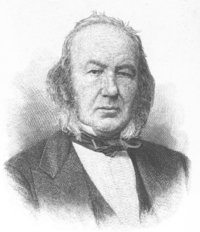Claude Bernard
|
|
Claude Bernard (July 12, 1813 – February 10, 1878) was a French physiologist.
Life
Bernard was born in the village of Saint-Julien near Villefranche-sur-Saône. He received his early education in the Jesuit school of that town, and then proceeded to the college at Lyon, which, however, he soon left to become assistant in a druggist's shop. His leisure hours were devoted to the composition of a vaudeville comedy, and the success it achieved moved him to attempt a prose drama in five acts, Arthur de Bretagne. At the age of twenty-one he went to Paris, armed with this play and an introduction to Saint-Marc Girardin, but the critic dissuaded him from adopting literature as a profession, and urged him rather to take up the study of medicine. This advice he followed, and in due course became interne at the Hotel Dieu. In this way he was brought into contact with the great physiologist, François Magendie, who was physician to the hospital, and whose official 'preparateur' at the Collège de France he became in 1841. In 1845 he married Françoise Marie (Fanny) Martin for convenience; the marriage was arranged by a colleague and her dowry helped finance his experiments. In 1847 he was appointed his deputy-professor at the college, and in 1855 he succeeded him as full professor.
Some time previously Bernard had been chosen the first occupant of the newly-instituted chair of physiology at the Sorbonne. There no laboratory was provided for his use, but Louis Napoleon, after an interview with him in 1864, supplied the deficiency, at the same time building a laboratory at the Muséum national d'Histoire naturelle in the Jardin des Plantes, and establishing a professorship, which Bernard left the Sorbonne to accept in 1868, the year in which he was admitted a member of the Académie française. When he died he was accorded a public funeral - an honour which had never before been bestowed by France on a man of science.
Works
Claude Bernard's aim, as he stated in his own words, was to establish scientific method in medicine. He dismissed many previous misconceptions, took nothing for granted and was relying on experimentation. Unlike his contemporaries he insisted that all living creature were also bound by the same laws as inanimate matter.
Claude Bernard's first important work was on the functions of the pancreas gland, the juice of which he proved to be of great significance in the process of digestion; this achievement won him the prize for experimental physiology from the French Academy of Sciences. A second investigation - perhaps his most famous was on the glycogenic function of the liver; in the course of this he was led to the conclusion, which throws light on the causation of diabetes mellitus, that the liver, in addition to secreting bile, is the seat of an internal secretion, by which it prepares sugar at the expense of the elements of the blood passing through it. A third research resulted in the discovery of the vaso-motor system. While engaged, about 1851, in examining the effects produced in the temperature of various parts of the body by section of the nerve or nerves belonging to them, he noticed that division of the cervical sympathetic gave rise to more active circulation and more forcible pulsation of the arteries in certain parts of the head, and a few months afterwards he observed that electrical excitation of the upper portion of the divided nerve had the contrary effect. In this way he established the existence of vaso-motor nerves, both vaso-dilalator and vaso-constrictor.
Milieu intérieur, internal environment, was the original concept of Bernard that to this day is of utmost importance. Conditions in the world around us constantly change, but delicate balance of internal characteristics of our bodies is not affected. It is achieved through what we call it today homeostasis.
The study of the physiological action of poisons was also a favourite one with him, his attention being devoted in particular to curare and carbon monoxide gas.
Bernard practiced vivisection to the disgust of his wife and his daughter. He firmly believed that the advancement of medicine and the relief of human suffering justified the suffering of animals but his wife was not convinced, the couple were officially separated in 1869 and his wife went on to actively campaign against the practise vivisection.
On his passing, Claude Bernard was interred in Le Père Lachaise Cemetery in Paris.
Reference
| Preceded by: Marie-Jean-Pierre Flourens | Seat 29 Académie française | Succeeded by: Ernest Renan |

